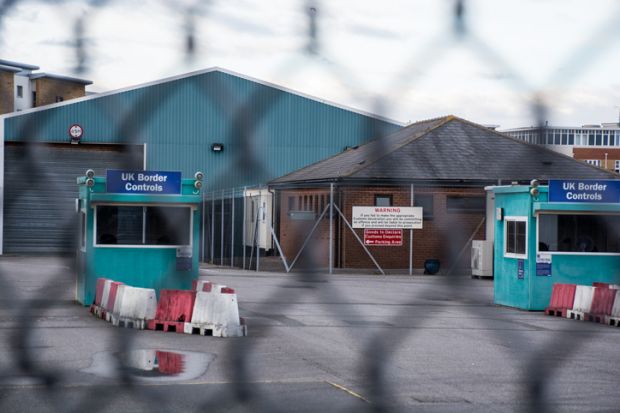The UK’s Home Office should have done more to protect the rights of innocent students caught up in an English language testing scandal, the National Audit Office says.
A report by the watchdog says that the Home Office had cancelled international students’ visas without properly checking whether they had actually cheated, meaning that some people may have been wrongly accused and in some cases, unfairly removed from the UK.
The Home Office action was launched in 2014, after a BBC Panorama investigation exposed widespread fraud at English language test centres conducting exams for the Education Testing Service (ETS). Reporters found students at certain testing centres had paid others to take their spoken and written exams, and an invigilator had read out the answers to multiple-choice questions.
Since the scandal, 2,468 people have been forced to leave and 391 were refused re-entry to the UK, the NAO says. In total, at least 11,356 people who took the language tests have left the country.
So far, 31 defendants from six organised crime groups have stood trial and 25 have been convicted. Twenty-one have received prison sentences totalling 70 years, and four more await sentencing.
Ninety-six colleges had their licences to sponsor visas suspended, while only eight have been reinstated since.
Sir Amyas Morse, the head of the NAO, said that the Home Office “acted vigorously” to exclude individuals and deal with colleges involved in the scandal.
However, he said that the NAO believed the department should have taken “an equally vigorous approach to protecting those who did not cheat but who were still caught up in the process, however small a proportion they might be. This did not happen.”
To work out the scale of the fraud, ETS had used voice recognition software to determine which tests had been cheated on, marking them as invalid, questionable or cleared of suspicion.
However, according to the NAO report, “for two years the department revoked the visas of anyone with an invalid test, without expert assurance of the validity of voice recognition evidence”.
ETS originally identified virtually every test in the UK as suspicious. After employing two human listeners to verify the results, it identified 58 per cent as invalid, 39 per cent questionable and cleared the rest.
ETS had not used the voice recognition software before. A National Union of Students-commissioned expert review said that voice recognition software could have made errors in up to 20 per cent of cases and human listeners could have made errors in up to 30 per cent of cases. However, a Home Office commissioned expert said that the margin of error was 1 per cent.
The NAO said that it is difficult to identify how many students were wrongly identified, but had found “anomalies” that the Home Office had not looked into, including thousands of people who were suspected of cheating based on voice recognition checks but had low scores in multiple-choice tests.
Many students have appealed against the decisions to revoke their visas. By March 2019, 12,500 appeals had been heard and 3,700 had been won. However, the Home Office has not tracked the reasons why.
The report also said that students at the colleges that had their licences revoked were affected irrespective of whether they been involved in the scandal.
Meg Hillier, the chair of the Public Accounts Committee, said that the Home Office had responded to the testing scandal with a “no-holds barred approach”.
“The Home Office made no effort to identify innocent people, and may have removed some from the UK who were not guilty of cheating,” the MP said. “The Home Office must take urgent steps to check whether its response to cheating has been fair and proportionate for all those involved.”
The Home Office said: “As the National Audit Office has highlighted, the Tier 4 [visa] system was subject to widespread abuse in 2014 and almost all those involved in the cheating were linked to private colleges which the Home Office already had significant concerns about.
“The report is clear on the scale and organised nature of the abuse, which is demonstrated by the fact that 25 people who facilitated this fraud have received criminal convictions.”
Register to continue
Why register?
- Registration is free and only takes a moment
- Once registered, you can read 3 articles a month
- Sign up for our newsletter
Subscribe
Or subscribe for unlimited access to:
- Unlimited access to news, views, insights & reviews
- Digital editions
- Digital access to THE’s university and college rankings analysis
Already registered or a current subscriber? Login








